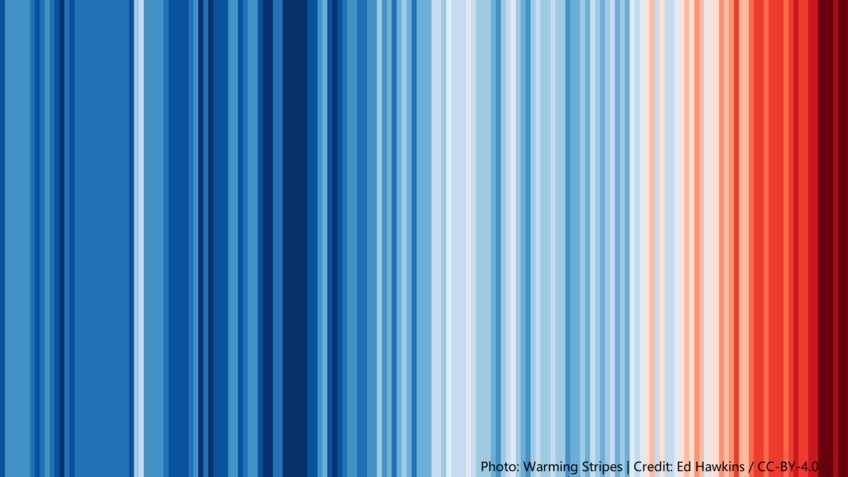
Max Planck Institute of Geoanthropology Climate Statement

Human-induced climate change is real. Average global temperatures have increased by 1.09°C since 1880, with a faster temperature acceleration over recent decades. Planet-wide, there has been an unprecedented surge in climate-related disasters, including devasting flooding, record-shattering heat waves and wildfires, and extraordinary hurricane seasons and cyclones. In addition, climate change affects vulnerable regions such as the Antarctic and Greenland ice sheets, and disproportionally impacts some of the Earth’s most biodiverse ecosystems, including warm-water coral reefs, coastal plains, and the Amazon rainforest.
Our own research shows that the Earth's climate has changed repeatedly throughout history. But most of these climate changes are attributed to natural variations in the amount of solar energy our planet receives. In contrast, current climate change is unequivocally the result of humans emitting greenhouse gases (GHG) into the atmosphere. Carbon dioxide emissions from fossil fuels have increased more than 200 times greater in the last 50 years than emissions from natural sources after the last Ice Age. Unless there are immediate, rapid and large-scale reductions in GHG emissions, we will reach a 1.5°C rise in global temperature within a couple decades. This will further increase the severity of heat waves and extreme weather events. At 2°C of global warming, heat extremes will more often reach critical tolerance thresholds for agriculture and health, and make some cities and regions uninhabitable. Humans also are responsible for increased global extinction rates, and for the global loss of biodiversity through habitat destruction, forest removal, and ocean acidification. These impacts decrease the ability of natural systems to buffer extreme events.

Our own research also reveals that our human ancestors have often demonstrated remarkable abilities to innovate and adapt to climatic and environmental crises in the past. These adaptations were possible thanks to the invention of new technologies, the usage of groundwater resources, and the development of remarkable irrigation systems, for example. Humans also adapted to past climate change by migrating to new and more suitable territories, or by changing subsistence lifeways. Archaeological research also shows that much can be learned about sustainable use of land and resources from Indigenous traditions. But many of the options available to us in the past are not necessarily available to us today. The majority of global carbon emissions are the product of a few dozen powerful states and private corporations, while some of those populations most vulnerable to the resulting changes are constrained in their actions by poverty and global market demands. Some of the changes already set in motion—such as continued sea level rise—are irreversible over hundreds to thousands of years.
Yet, there are grounds for hope and optimism. Human progress, increased awareness, the rise of clean energy and other sustainable technologies, and actions towards leveling the social and economic inequalities that contribute to global warming all have immense potential to reverse current negative climatic and biodiversity trends. As we look to the future for new solutions and innovations, we should remember that the past can be mobilized as well. History is replete with examples of life changing for the better when people act together to overcome hardship, and the capacity for conscious cooperation is a hallmark of our species. Archaeological research is providing insights into early forms of sustainable agriculture, soil enhancement, city planning, and fire and forest management that have extreme relevance today. The work we are doing in the institute informs conservation and restoration strategies, food security research and planning, and community-led land management. Research of this kind brings a historical perspective to present day challenges and processes, helping us to understand how the human species reached this point and where we can go from here.
The scale of human action required to address the climate crisis is no longer just local or regional, but global. Industrial corporations and developed economies bear a special responsibility for curbing GHG emissions and for sharing resources and technologies for sustainable climate solutions. While perhaps far more minor in comparison, as individual citizens, particularly in affluent societies, we can also influence collective actions and change our own behavior by forgoing old habits in our daily life that contribute substantially to GHG emissions.
Institutes like ours must also become more informed and aware of how our operations contribute to the global carbon footprint. Here at the Max Planck Institute of Geoanthropology, we have established a Sustainability Commission that is developing ideas to make our daily operations and research more sustainable. We are working to make our institute greener and some initiatives have already been successfully implemented, including a shift to the use of recycled paper, getting rid of our company car, installing e-bikes for use for local work-related travel, and catering vegetarian lunches for visiting guests. We are also striving to support sustainable actions locally and internationally, especially in Africa and southeast Asia where we have the most research collaborations. Our institute has also organized Earth Week and Vegan Day events in 2021 to educate ourselves, raise awareness, and promote sustainability in our everyday life.
Our institute stands by the recent climate emergency declaration and supports the call for transformative change to address the current climate emergency. Action must be taken to protect life on Earth and support the vital functions of our ecosystems. We must join together as a global community with a shared sense of urgency, cooperation, and equity. The Max Planck Institute of Geoanthroplogy is proud to work with our global partners and local community to help achieve the changes needed now to ensure a stable and safe future for everyone.

